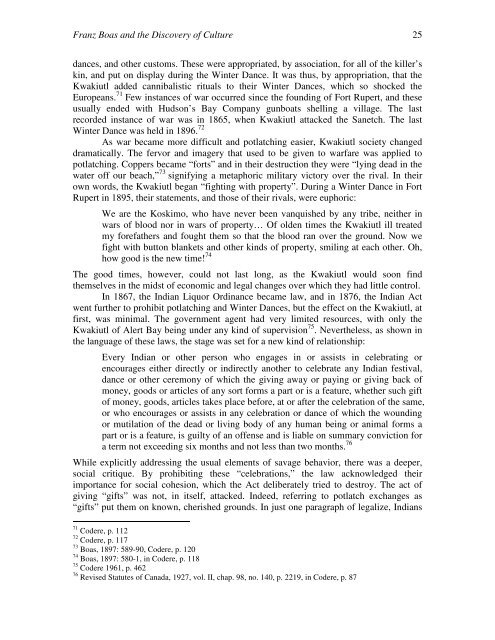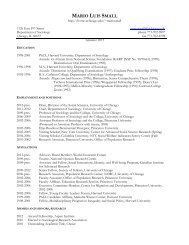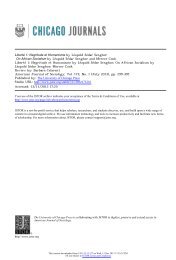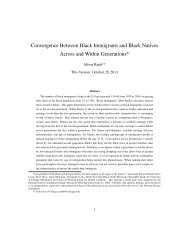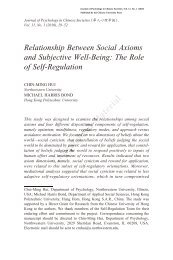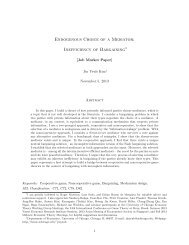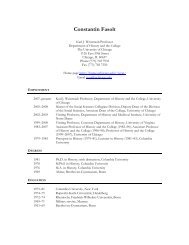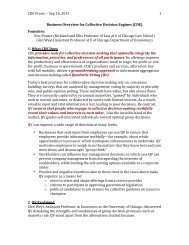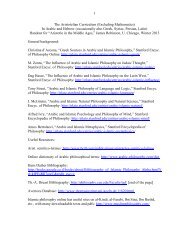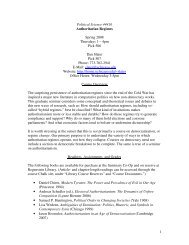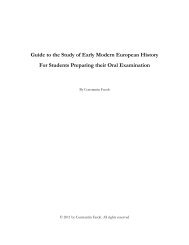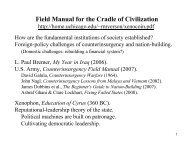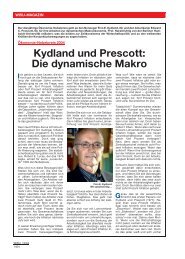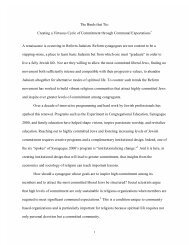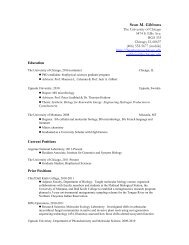Franz Boas and the Discovery of Culture - Personal Web Pages ...
Franz Boas and the Discovery of Culture - Personal Web Pages ...
Franz Boas and the Discovery of Culture - Personal Web Pages ...
Create successful ePaper yourself
Turn your PDF publications into a flip-book with our unique Google optimized e-Paper software.
<strong>Franz</strong> <strong>Boas</strong> <strong>and</strong> <strong>the</strong> <strong>Discovery</strong> <strong>of</strong> <strong>Culture</strong> 25<br />
dances, <strong>and</strong> o<strong>the</strong>r customs. These were appropriated, by association, for all <strong>of</strong> <strong>the</strong> killer’s<br />
kin, <strong>and</strong> put on display during <strong>the</strong> Winter Dance. It was thus, by appropriation, that <strong>the</strong><br />
Kwakiutl added cannibalistic rituals to <strong>the</strong>ir Winter Dances, which so shocked <strong>the</strong><br />
Europeans. 71 Few instances <strong>of</strong> war occurred since <strong>the</strong> founding <strong>of</strong> Fort Rupert, <strong>and</strong> <strong>the</strong>se<br />
usually ended with Hudson’s Bay Company gunboats shelling a village. The last<br />
recorded instance <strong>of</strong> war was in 1865, when Kwakiutl attacked <strong>the</strong> Sanetch. The last<br />
Winter Dance was held in 1896. 72<br />
As war became more difficult <strong>and</strong> potlatching easier, Kwakiutl society changed<br />
dramatically. The fervor <strong>and</strong> imagery that used to be given to warfare was applied to<br />
potlatching. Coppers became “forts” <strong>and</strong> in <strong>the</strong>ir destruction <strong>the</strong>y were “lying dead in <strong>the</strong><br />
water <strong>of</strong>f our beach,” 73 signifying a metaphoric military victory over <strong>the</strong> rival. In <strong>the</strong>ir<br />
own words, <strong>the</strong> Kwakiutl began “fighting with property”. During a Winter Dance in Fort<br />
Rupert in 1895, <strong>the</strong>ir statements, <strong>and</strong> those <strong>of</strong> <strong>the</strong>ir rivals, were euphoric:<br />
We are <strong>the</strong> Koskimo, who have never been vanquished by any tribe, nei<strong>the</strong>r in<br />
wars <strong>of</strong> blood nor in wars <strong>of</strong> property… Of olden times <strong>the</strong> Kwakiutl ill treated<br />
my forefa<strong>the</strong>rs <strong>and</strong> fought <strong>the</strong>m so that <strong>the</strong> blood ran over <strong>the</strong> ground. Now we<br />
fight with button blankets <strong>and</strong> o<strong>the</strong>r kinds <strong>of</strong> property, smiling at each o<strong>the</strong>r. Oh,<br />
how good is <strong>the</strong> new time! 74<br />
The good times, however, could not last long, as <strong>the</strong> Kwakiutl would soon find<br />
<strong>the</strong>mselves in <strong>the</strong> midst <strong>of</strong> economic <strong>and</strong> legal changes over which <strong>the</strong>y had little control.<br />
In 1867, <strong>the</strong> Indian Liquor Ordinance became law, <strong>and</strong> in 1876, <strong>the</strong> Indian Act<br />
went fur<strong>the</strong>r to prohibit potlatching <strong>and</strong> Winter Dances, but <strong>the</strong> effect on <strong>the</strong> Kwakiutl, at<br />
first, was minimal. The government agent had very limited resources, with only <strong>the</strong><br />
Kwakiutl <strong>of</strong> Alert Bay being under any kind <strong>of</strong> supervision 75 . Never<strong>the</strong>less, as shown in<br />
<strong>the</strong> language <strong>of</strong> <strong>the</strong>se laws, <strong>the</strong> stage was set for a new kind <strong>of</strong> relationship:<br />
Every Indian or o<strong>the</strong>r person who engages in or assists in celebrating or<br />
encourages ei<strong>the</strong>r directly or indirectly ano<strong>the</strong>r to celebrate any Indian festival,<br />
dance or o<strong>the</strong>r ceremony <strong>of</strong> which <strong>the</strong> giving away or paying or giving back <strong>of</strong><br />
money, goods or articles <strong>of</strong> any sort forms a part or is a feature, whe<strong>the</strong>r such gift<br />
<strong>of</strong> money, goods, articles takes place before, at or after <strong>the</strong> celebration <strong>of</strong> <strong>the</strong> same,<br />
or who encourages or assists in any celebration or dance <strong>of</strong> which <strong>the</strong> wounding<br />
or mutilation <strong>of</strong> <strong>the</strong> dead or living body <strong>of</strong> any human being or animal forms a<br />
part or is a feature, is guilty <strong>of</strong> an <strong>of</strong>fense <strong>and</strong> is liable on summary conviction for<br />
a term not exceeding six months <strong>and</strong> not less than two months. 76<br />
While explicitly addressing <strong>the</strong> usual elements <strong>of</strong> savage behavior, <strong>the</strong>re was a deeper,<br />
social critique. By prohibiting <strong>the</strong>se “celebrations,” <strong>the</strong> law acknowledged <strong>the</strong>ir<br />
importance for social cohesion, which <strong>the</strong> Act deliberately tried to destroy. The act <strong>of</strong><br />
giving “gifts” was not, in itself, attacked. Indeed, referring to potlatch exchanges as<br />
“gifts” put <strong>the</strong>m on known, cherished grounds. In just one paragraph <strong>of</strong> legalize, Indians<br />
71 Codere, p. 112<br />
72 Codere, p. 117<br />
73 <strong>Boas</strong>, 1897: 589-90, Codere, p. 120<br />
74 <strong>Boas</strong>, 1897: 580-1, in Codere, p. 118<br />
75 Codere 1961, p. 462<br />
76 Revised Statutes <strong>of</strong> Canada, 1927, vol. II, chap. 98, no. 140, p. 2219, in Codere, p. 87


